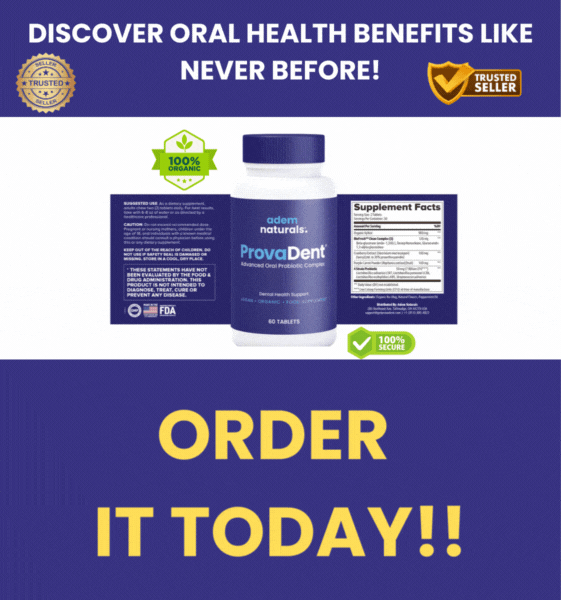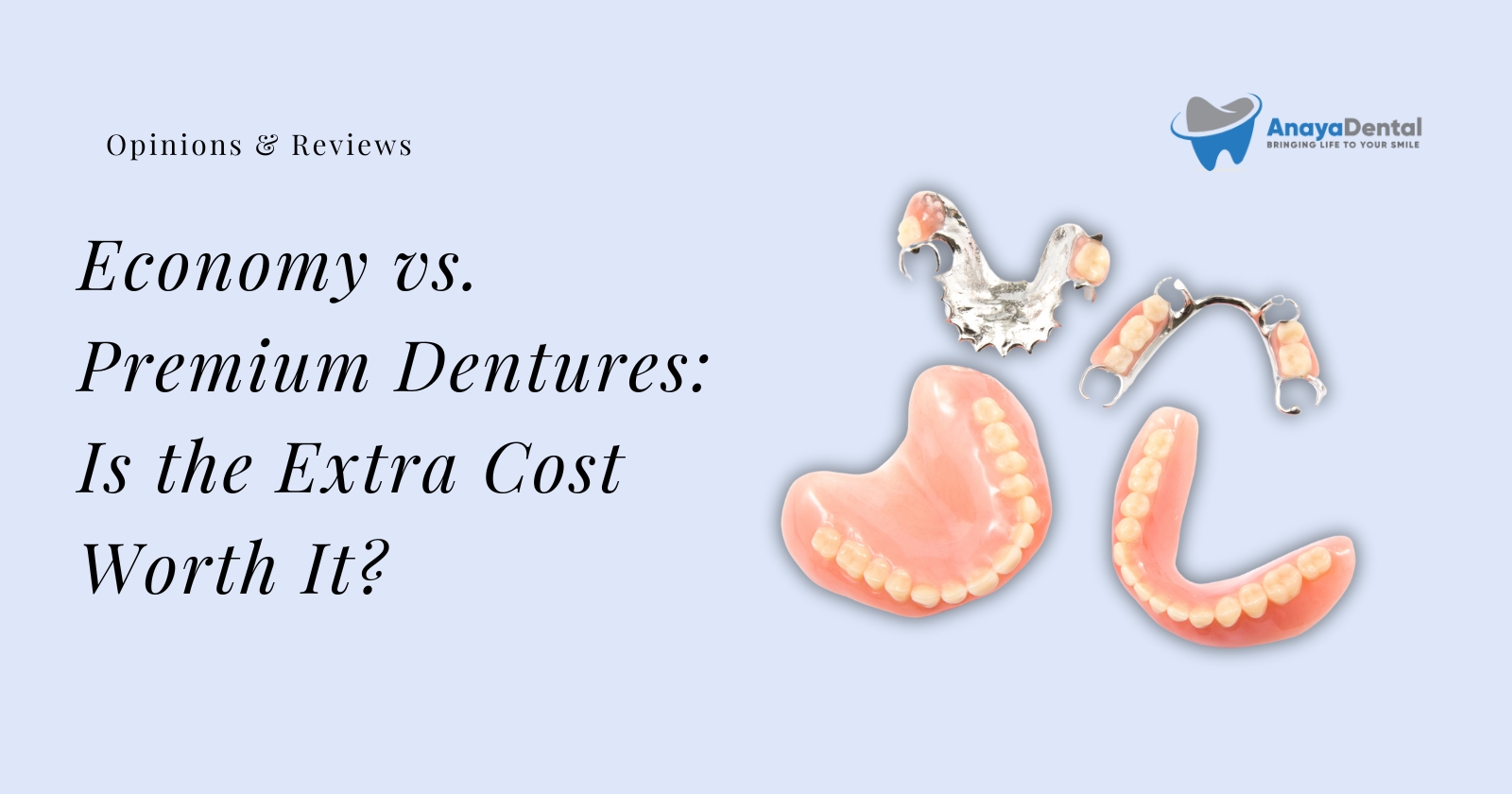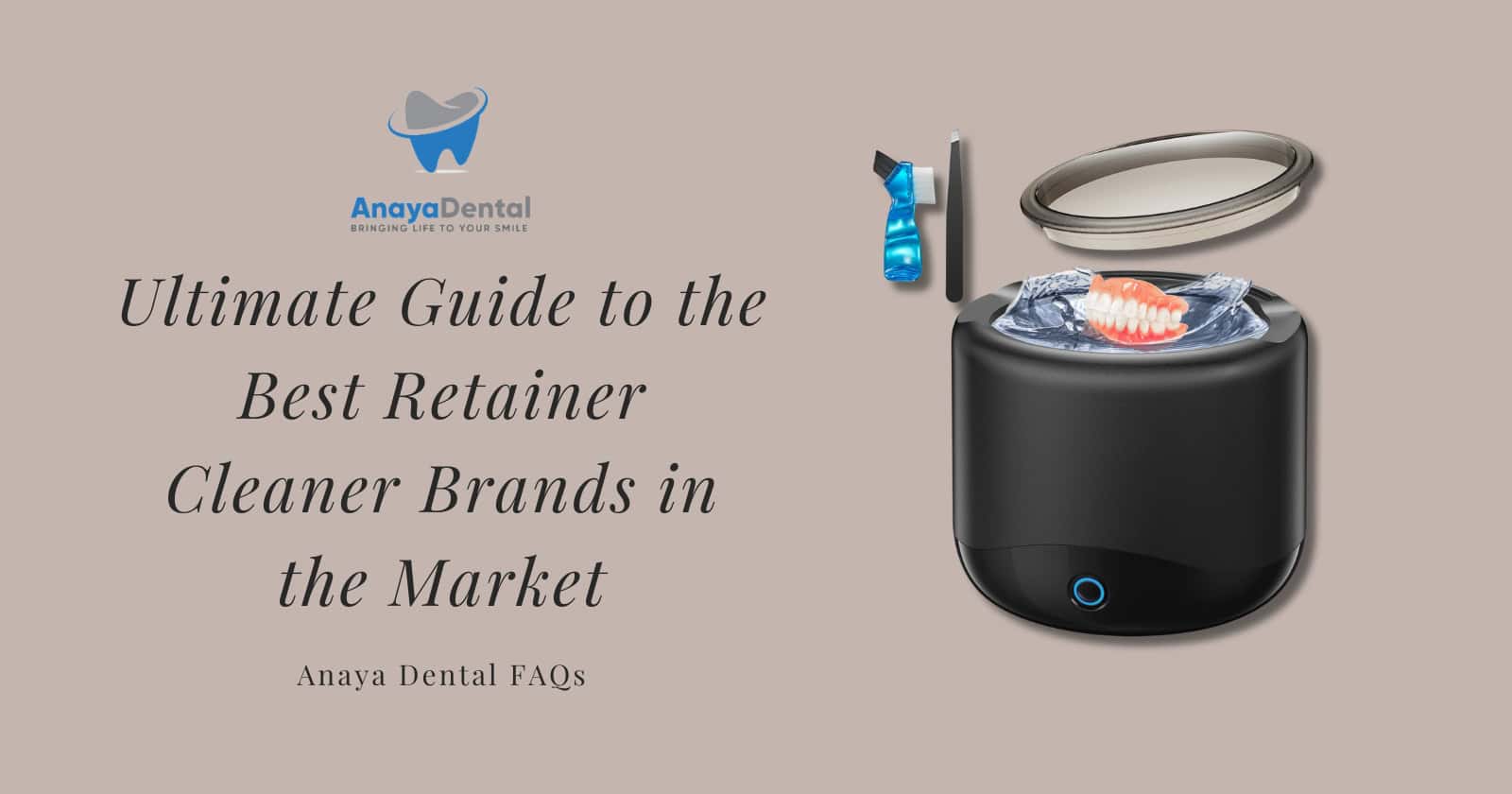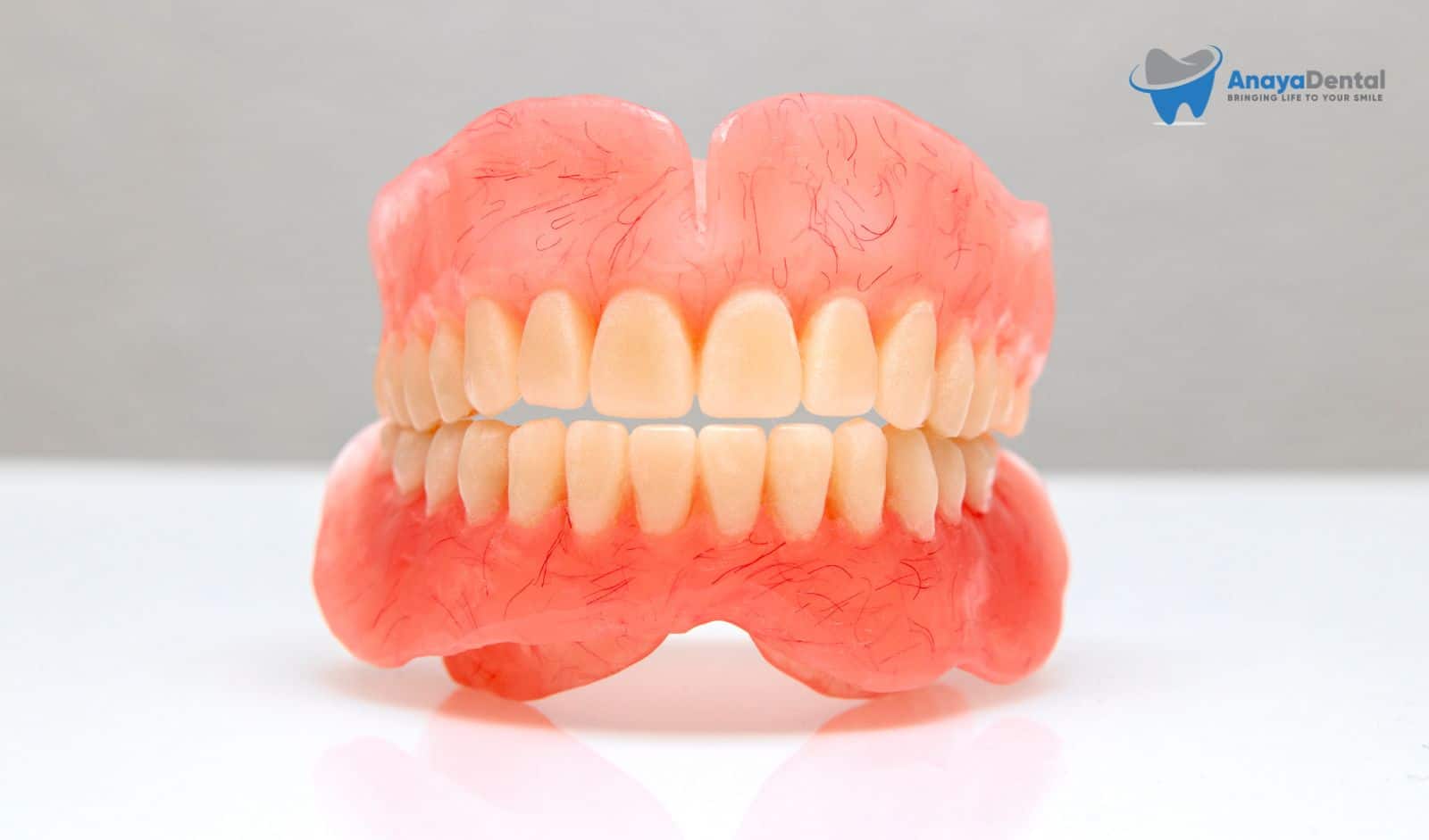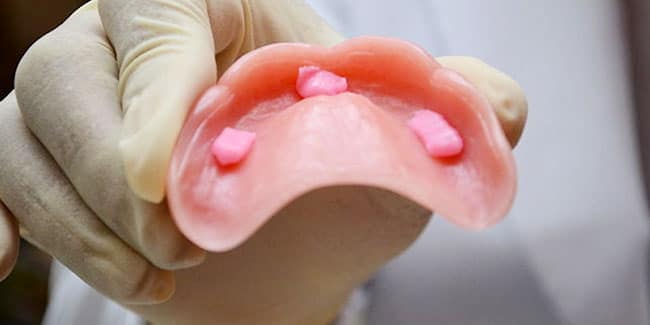Dentures are a lifesaver for many, restoring smiles and improving chewing ability. Yet, keeping them clean can be a real challenge. Unlike natural teeth, dentures are porous and prone to accumulating stubborn stains, plaque buildup, and even bad odor. Here’s why keeping dentures clean can be so frustrating:
Stubborn Stains: Coffee, tea, wine, and certain foods can leave unsightly stains on your dentures. Regular brushing may not be enough to remove these deeply ingrained discolorations.
Plaque Buildup: Just like natural teeth, dentures can accumulate plaque, a sticky film harboring bacteria. This not only contributes to stains but also increases the risk of developing mouth infections like thrush.
Try Our Dental Calculators
Unpleasant Odors: Over time, trapped food particles and bacteria can lead to the development of bad breath, causing embarrassment and impacting social interactions.
These cleaning problems can not only affect your confidence but also pose a threat to your oral health. Fortunately, there’s a powerful solution on the market: Ultrasonic Denture Cleaners.

Ultrasonic Cleaning Technology – How does it work?
Ultrasonic denture cleaners pack a powerful punch! Unlike brushing, they use a technology called ultrasonic cleaning to achieve a remarkably thorough clean. But how exactly does it work?
Ultrasonic cleaning relies on high-frequency sound waves. Imagine sound waves like ripples on a pond. Regular sounds we hear have low frequencies, creating small ripples. Ultrasonic cleaners, however, operate at much higher frequencies, generating microscopic vibrations inaudible to the human ear.
When these high-frequency sound waves travel through the cleaning solution (water with denture cleaner), they create millions of tiny bubbles. These bubbles rapidly expand and collapse, a process known as cavitation.
The Power of Cavitation:
The collapsing bubbles release a surprising amount of energy. This energy gently cleans the surface of your dentures, reaching even the tiniest nooks and crannies. Think of it as a microscopic army of bubbles scrubbing away plaque, stains, and odor-causing bacteria!
This powerful cleaning action, achieved without harsh scrubbing, allows you to get a deep clean for your dentures in the comfort of your own home.
Benefits of Ultrasonic Denture Cleaners
Ultrasonic denture cleaners are revolutionizing denture care, offering a powerful and convenient way to keep your dentures sparkling clean and fresh. The benefits of ultrasonic denture cleaners are:
Features Designed for Ease
- Compact and Convenient: Unlike bulky cleaning machines, ultrasonic denture cleaners come in a variety of sizes to fit comfortably on any bathroom countertop.
- Optimal Capacity: Select a cleaner with a tank large enough to fully submerge your dentures and cleaning solution. This ensures thorough cleaning and prevents overcrowding, which can hinder the cleaning process.
- Effortless Cleaning with Timers: Many cleaners feature digital timers, allowing you to set a cleaning cycle for the recommended time (usually 3-5 minutes) and walk away.
- Auto Shut-Off: For added convenience and safety, most ultrasonic cleaners come with an auto shut-off function. This ensures the cleaner automatically turns off after the cleaning cycle is complete, preventing wasted energy and potential overheating.

Benefits Beyond Brushing
Ultrasonic cleaning goes beyond the limitations of traditional brushing, offering a multitude of benefits for denture wearers:
- Deep Plaque Removal: The power of cavitation creates microscopic bubbles that reach deep into crevices and clasps, dislodging and removing even the most stubborn plaque buildup.
- Farewell to Tough Stains: Coffee, tea, wine – no stain is a match for the intense cleaning action of ultrasonic waves. Your dentures will emerge noticeably brighter and whiter.
- Combating Denture Odor for Good: Ultrasonic cleaning effectively eliminates odor-causing bacteria that can build up over time. This results in long-lasting freshness and increased confidence when interacting with others.
Disadvantages of Ultrasonic Denture Cleaners
Ultrasonic denture cleaners are a game-changer for denture hygiene, but it’s important to weigh both the pros and cons before investing. Some potential drawbacks are:
Higher Upfront Cost
Compared to traditional denture brushes and cleansers, the initial price tag of an ultrasonic cleaner can be steeper.
Brushing Still Recommended
Ultrasonic cleaning is fantastic, but it doesn’t eliminate the need for gentle brushing with a soft-bristled brush and denture cleanser. Brushing helps remove loosened debris and provides a final polish for a brighter smile.
Improper Use Risks
While uncommon, improper use or very old/fragile dentures can be damaged by the ultrasonic vibrations. Always consult your dentist to ensure ultrasonic cleaning is suitable for your specific dentures.
Availability Challenges
While gaining popularity, ultrasonic cleaners may not be as widely available in all stores compared to traditional denture cleaning supplies. You might need to rely on online retailers or specialty stores.
Space Considerations
While compact models exist, some ultrasonic cleaners can occupy valuable counter space. This might be a concern for people with limited bathroom storage.
Steps to use Ultrasonic denture cleaner
Using an ultrasonic denture cleaner is incredibly easy. Here’s a step-by-step guide to experience the difference:
- Prepare the Cleaning Solution: Fill the cleaner’s tank with warm water and add the recommended amount of denture cleaning solution as specified by the manufacturer.
- Gently Place Your Dentures: Carefully place your dentures in the provided cleaning basket or tray, ensuring they are fully submerged in the solution.
- Set the Timer: Choose the appropriate cleaning cycle based on your cleaner’s instructions (typically 3-5 minutes). Relax and let the ultrasonic waves work their magic!
- Rinse and Brush (Optional): After the cycle is complete, thoroughly rinse your dentures with clean water. For an extra touch, you can gently brush them with a soft-bristled brush for a final polish. However, always consult your dentist for specific recommendations regarding brushing your dentures.
With an ultrasonic denture cleaner, you can achieve a deeper clean in a fraction of the time compared to traditional methods.
Should You Buy an Ultrasonic Denture Cleaner? Unveiling a Brighter Smile
Ultrasonic denture cleaners are revolutionizing denture care, but are they the right choice for you? Let’s break down the key factors to help you decide between ultrasonic cleaning and the traditional method of brushing with denture cleanser.
Traditional Brushing vs. Ultrasonic Cleaning
Cost Comparison
- Traditional Brushing: While denture cleanser and brushes are relatively inexpensive, the cost can add up over time. Replacing worn-out brushes and potentially needing stronger cleansers for stubborn plaque buildup can lead to ongoing expenses.
- Ultrasonic Denture Cleaner: The upfront cost of an ultrasonic cleaner may seem higher. However, these machines are durable and eliminate the need for frequent brush replacements. Consider the long-term cost savings and the potential for improved denture lifespan.
Size and Capacity Considerations
Ultrasonic denture cleaners come in a variety of sizes to suit your needs. You’ll find compact models around 6 x 3 x 3 inches perfect for small bathroom countertops, to larger units that can accommodate bulky dentures or multiple cleaning sets. Choose a cleaner with a tank capacity large enough to comfortably hold your dentures and cleaning solution without cramming them in, which can hinder cleaning.
Additional Features to Enhance Cleaning
While some ultrasonic cleaners offer a simple on/off function, many come with additional features that boost convenience and cleaning efficacy:
- Digital Timers: Set a cleaning cycle for optimal results and forget about scrubbing for minutes on end.
- Auto Shut-Off: Enjoy peace of mind knowing the cleaner will turn off automatically after the cycle completes.
- Heating Function: Some models offer a heating element that can further enhance the cleaning process by loosening stubborn debris.
Denture Cleaner Machine vs. Denture Cleaning Brush
When comparing denture cleaner machines (such as ultrasonic cleaners) to denture cleaning brushes, both have distinct roles in maintaining denture hygiene:
Denture Cleaner Machines
- Method: Use ultrasonic waves to create micro-bubbles that deeply clean and remove bacteria, stains, and plaque.
- Efficiency: Provides a thorough clean in hard-to-reach areas without physical scrubbing.
- Convenience: Automated cleaning with minimal effort and time.
Denture Cleaning Brushes
- Method: Manual scrubbing to physically remove debris and plaque.
- Precision: Allows for targeted cleaning, especially on superficial stains and residue.
- Cost: Generally cheaper and widely available.
While ultrasonic cleaners offer a deep, hands-off cleaning experience, denture brushes are essential for daily maintenance and spot cleaning. Using both in tandem provides the most comprehensive care for dentures.
The Verdict: Is an Ultrasonic Cleaner Right for You?
If you’re looking for a more effective and convenient way to clean your dentures, an ultrasonic cleaner is a worthwhile investment. Here’s who might benefit the most:
- Individuals with Dexterity Limitations: The ease of use makes cleaning a breeze for those with limited hand mobility.
- Busy Lifestyles: The time-saving convenience is ideal for people on the go.
- Anyone Seeking a Superior Clean: If you desire a deeper clean and fresher dentures, an ultrasonic cleaner is an excellent investment in your oral health.
Ultrasonic vs. Traditional Denture Cleaning Methods
Here is the table describing the differences between both the ultrasonic and traditional denture cleaning methods:
| Feature | Ultrasonic Cleaning | Traditional Brushing with Denture Cleanser |
| Effectiveness | Deep clean, reaches crevices, removes stubborn stains & plaque | Surface clean, may struggle with deep crevices & stains |
| Convenience | Easy to use, set timer & forget | Requires daily manual scrubbing |
| Time | Faster (typically 3-5 minute cycles) | More time-consuming |
| Effort | Minimal effort | Requires scrubbing |
| Benefits | Improved oral hygiene, fresher breath, brighter smile | May not achieve deep clean, can damage dentures with excessive scrubbing |
| Ideal for | Busy lifestyles, dexterity limitations, anyone seeking a superior clean | May be sufficient for some, not ideal for busy schedules or dexterity limitations |
Conclusion
Ultrasonic denture cleaners offer a highly effective and convenient solution for denture maintenance. They use advanced technology to produce deep cleaning through ultrasonic waves, efficiently removing plaque, stains, and bacteria.
These devices minimize manual scrubbing and ensure thorough cleanliness, even in hard-to-reach areas. While they may require an initial investment, the long-term benefits of improved hygiene and comfort make ultrasonic denture cleaners a worthwhile choice for denture wearers seeking optimal oral health.
FAQs
What is ultrasonic denture cleaner solution?
Ultrasonic denture cleaners require a special cleaning solution formulated for this technology. Don’t use regular dish soap, as it can foam excessively and damage the cleaner. Look for denture cleanser specifically designed for ultrasonic machines. These solutions work synergistically with the ultrasonic waves to remove stains, plaque, and odor-causing bacteria, leaving your dentures sparkling clean and fresh.
Do ultrasonic cleaners work for dentures?
Yes, ultrasonic cleaners effectively clean dentures. They use high-frequency sound waves to create bubbles that blast away plaque, stains, and bacteria from even hidden crevices, leaving dentures feeling noticeably cleaner and fresher.
Can you use an ultrasonic scaler on a denture?
No, ultrasonic scalers are too harsh for dentures. They’re designed to remove tough deposits from teeth and could damage the delicate acrylic material of dentures. Stick to ultrasonic cleaners designed specifically for dentures.
What is the fastest way to clean dentures?
The fastest way to clean dentures is with an ultrasonic cleaner. Simply fill the tank, place your dentures in, and set the timer. The ultrasonic waves do the cleaning for you in just a few minutes.
What machine do dentists use to clean dentures?
While dentists may have access to a variety of cleaning equipment for dentures, they most likely use ultrasonic cleaners for their in-office cleaning processes. These cleaners function similarly to the home versions, utilizing high-frequency sound waves to create microscopic bubbles that dislodge debris and bacteria from dentures.
Do ultrasonic denture cleaners really work?
Yes, ultrasonic denture cleaners are effective. They use high-frequency sound waves to create bubbles that burst, dislodging debris, bacteria, and stains from dentures, even in hard-to-reach areas. This method removes plaque and stubborn stains effectively and reduces odors. While they provide deep cleaning, occasional manual brushing is recommended to remove loosened particles, ensuring comprehensive denture hygiene.

